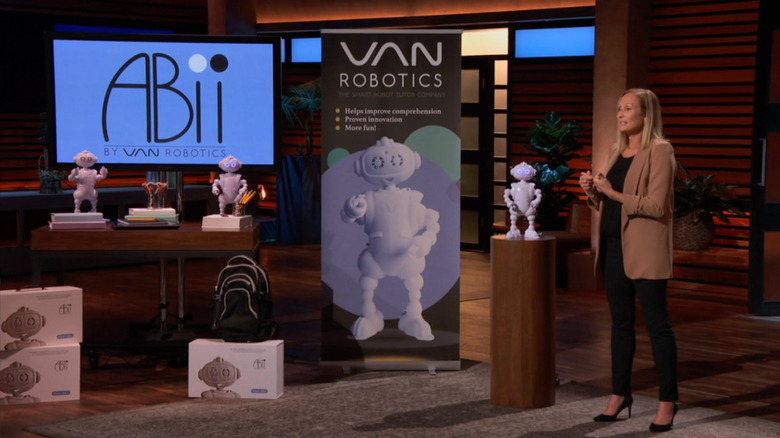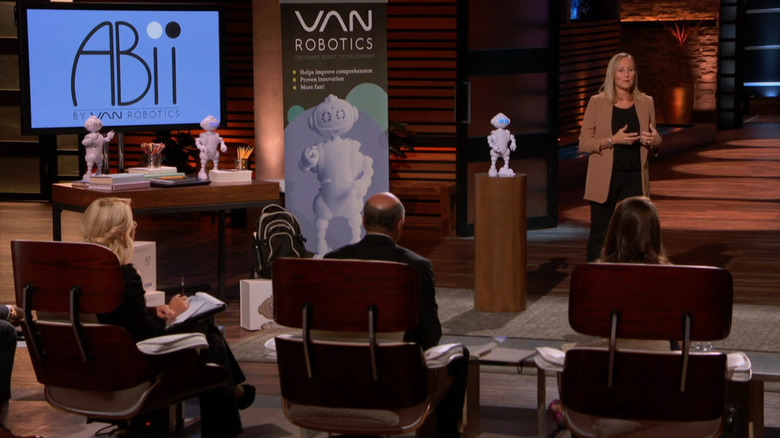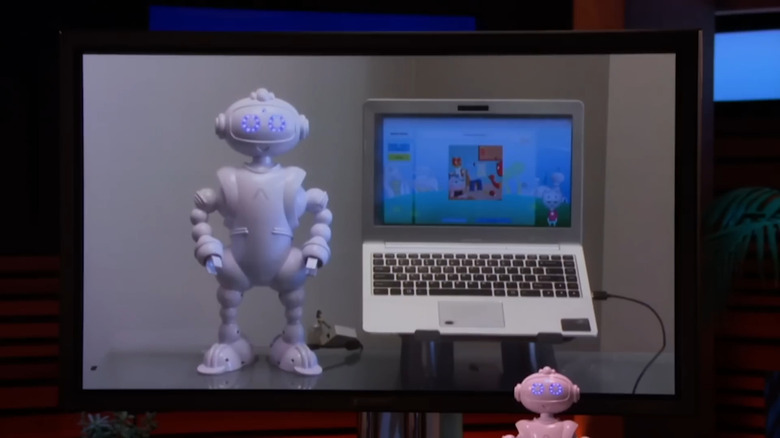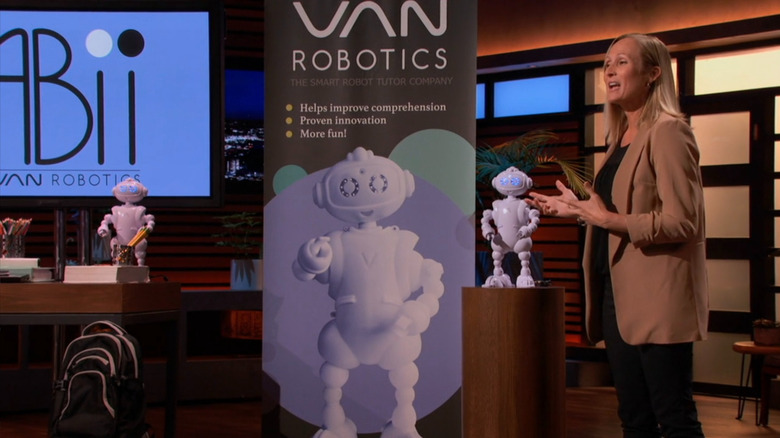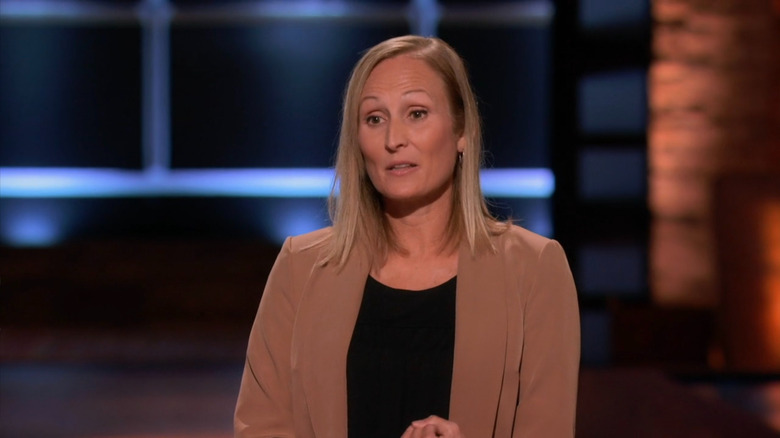What Happened To The ABii Robot From Shark Tank Season 11?
The 21st episode of the 11th season of "Shark Tank" premiered on ABC on May 1, 2020, to an audience of 4.8 million people per Nielsen Media Research's viewership ratings. In the fourth and final pitch of the episode, Van Robotics CEO Laura Boccanfuso sought an investment in her company, which was built around the Abii math tutor robot for children. At the time, the selling price of the robot was steep but not entirely outlandish, though it was only in the hands of 220 students so far, with no details given in the aired version of the pitch about the split between home and educational users and what that translated to in revenue. The Sharks largely felt that the company and product were too early and unproven for an investment and opted out, so Boccanfuso left the proverbial tank without a deal.
Though Boccanfuso doesn't appear to have given any interviews with specifics about the kind of sales Abii has done since she appeared on "Shark Tank," she's made it clear that sales boomed during COVID-19 lockdowns. More specifically: The period after lockdowns started but before remote classes were introduced, where Abii filled the void as a teacher for families. Between that and a price increase, Van Robotics seems to be doing well, with running the company continuing to be Boccanfuso's sole job while she travels to speaking engagements, trade shows, and events at youth organizations. Let's take a look at Abii's whole journey through "Shark Tank" and beyond.
What happened to Abii on Shark Tank?
Laura Boccanfuso entered the tank seeking $300,000 for a 10% stake in Van Robotics, her company selling Abii, a math tutor robot that's supposed to be particularly helpful for kids with attention issues. Manufactured for $250 while selling for $599 (home version) and $999 (school version), Abii's exact functionality — at least that'd clearly differentiate it — seemingly confused the Sharks at first, until Boccanfuso explained that the robot can use head tracking to determine if a child using it is actually paying attention. "Now, we're getting into what makes it unique, right?" exclaimed Mark Cuban. "Now we start to understand what differentiates you from a little teddy bear sitting there."
Lori Greiner and guest Shark Anne Wojcicki opted out first, both feeling that, with just 220 students having used the product so far in such a competitive space, it was too early to invest with Abii. Kevin O'Leary followed, citing his experience running The Learning Company. "It took me nine years to get 'Oregon Trail' into 70% of the schools," he said, referencing "Oregon Trail's" ubiquity in American public schools — which most recently led to a "Minecraft" offshoot of it being developed for the current generation — to explain how the K-12 computing market has long been difficult. Daymond John was next, echoing O'Leary's concerns, followed by Cuban, who felt that Abii didn't have enough of a clear differentiator from other programs to make it work an investment just yet. Laura left without a deal.
What happened to Abii after Shark Tank?
The Abii episode of "Shark Tank" came at the height of COVID-19 isolation, and in 2024, Laura Boccanfuso told Carolinian Magazine that the timing ended up benefitting Abii. "Parents were freaking out because their kids didn't have teachers," she said. "After the show aired, we got inundated with all these requests from parents who were like, 'My kid needs help. I'm not a teacher. I have to work from home. I don't have time. Help!'"
Though the article doesn't give any numbers, it says that Van Robotics sold "a lot of robots" that summer to parents who wanted Abii. "Even though we didn't get an offer, it made all the difference because it put us on the forefront of a lot of conversations of how these things can actually help kids and teachers when they're so strained in schools, especially now when we have a shortage of teachers and a diversity of needs among students," Boccanfuso added.
More good fortune came to Van Robotics five months after the episode aired, when Time Magazine put Abii on its "The Best Inventions of 2020" list the following November. As with Boccanfuso on "Shark Tank," Nadia Suleman's write-up focuses on Abii's "edge" over potential competition being that the robot can detect changes in attention levels and otherwise adjust to each child. "Schools more than ever need individualized learning help," Boccanfuso was quoted as saying in the Time blurb. "[They] don't have enough teachers in the classroom."
Is Van Robotics still in business?
From digging into the company website, it looks like Van Robotics is still in business, but there have been some major changes in the years since Abii was featured on "Shark Tank." The biggest and most immediately noticeable one is that the price for the Abii robot has increased significantly. The home version, which includes a year of curriculum for up to three different students, has doubled in price from $599 to $1,199. The classroom package, meanwhile isn't as directly comparable to what it was in 2020. Then, you got a single robot and the requisite in-school student licenses for $999. Now? The "Classroom Solution" is $6,000 with two robots included. Non-bundled curriculum subscriptions sell for $249 per year; only the home version includes the first year in the purchase price.
There are also options to buy the home curriculum and Abii robot individually, separately from each other. However, they require each other and the total price is the same as the default bundle, so it's not clear why these options exist. This option is also joined by "Classroom to Career," which teaches the robotics side of Abii to aspiring STEM students in a package where the robot kit sells for $1,400 and the curriculum is $150 per student per eight-week course. In theory, these "Classroom to Career" robots are supposed to be passed down the STEM students to younger students who would use Abii for its intended purpose as a virtual math tutor.
What's next for Van Robotics and its founder?
As of November 2022, Van Robotics was looking into pushing the "Classroom to Career" program harder, with part of the program being that completed Abii robots built by CTC participants would then be used as study aids by younger kids. "This idea started a while ago, but all the pieces and components all the people, the right people, are kind of working on this collaboratively to make it something really, really different," Laura Boccanfuso told the Carolina News and Reporter. "We said, 'No, we want this to be an opportunity for us to improve inclusion and equity across groups of students who didn't ever think of themselves as a STEM student. And so that's how it started to really gain momentum."
As for Boccanfuso herself, her LinkedIn page still lists her as Van Robotics' CEO. On her LinkedIn blog, she still posts semi-regularly. As of this writing, her most recent post dealt with what's described as an "early learning trial" working with various universities to use Abii to increase preschool-aged children's reading levels. Otherwise, it seems like she mainly posts when she goes on trips for speaking engagements, trade shows, and appearances at schools and youth organizations like local YMCAs. By all appearances, Van Robotics is a fully-functional business that continues to be her sole job with no end in sight. Compared to many other "Shark Tank" updates, like Season 6's DrumPants's or Season 7's Splikity, that's a pretty happy ending.
